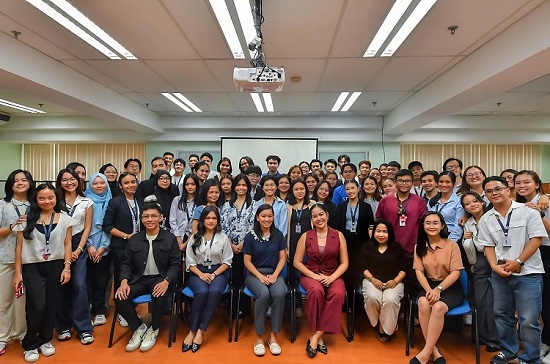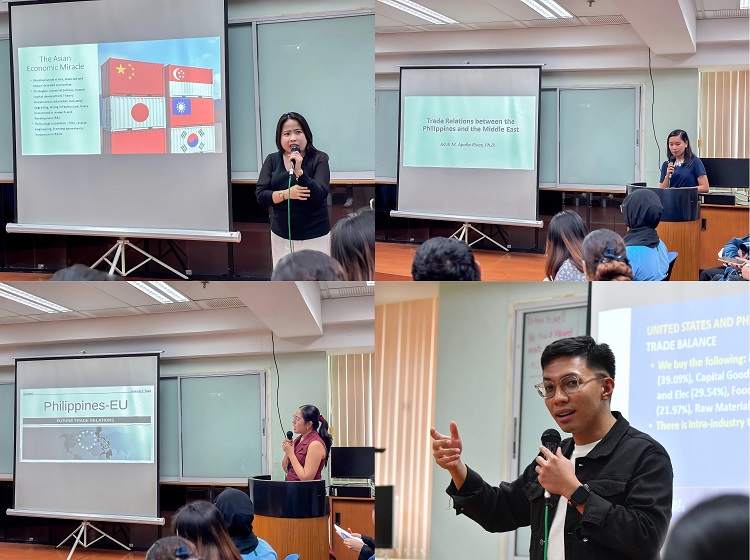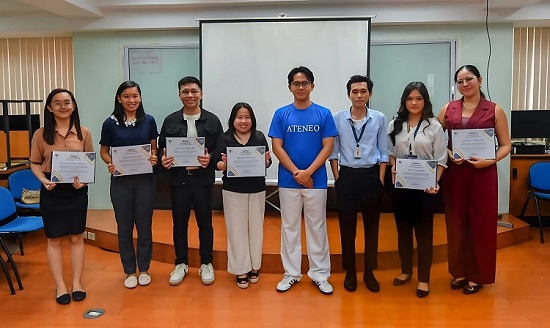By Jessica S Cahulogan

Photos by: Rroj Gavenia, Rafael La Victoria
“In learning you will teach, and in teaching you will learn.” This quote by Phil Collins perfectly captured the essence of the Geopolitics and Geoeconomics Trade Forum held on 30 April 2025, a collaborative initiative spearheaded by the 3rd year AB Economics and AB International Studies students of Xavier University – Ateneo de Cagayan. The forum served not only as a venue for academic enrichment but also as a vital platform for dissecting the Philippines’ role in the global trade landscape. It was a vibrant exchange of ideas that drew from multiple disciplines, reinforced by both historical insights and forward-looking economic strategies.
The event began with warm opening remarks from Fr Amado T Tumbali, SJ, MA, Chairperson of the Department of History and International Studies, who emphasized the power of knowledge and collaborative inquiry in shaping national development. Ms Jessica S Cahulogan, a faculty member of the Department of Economics and moderator of the Xavier University Economics Society (XU ECOSOC), laid the groundwork for the discussions with a clear presentation of the Philippines’ current international trade statistics, contextualizing the country's economic standing. Following her, Ms Nichole Christine D Virtudazo, faculty member of the Department of History and International Studies, provided an in-depth look at the history of international trade in the Philippines, tracing its evolution from the Spanish colonial period to contemporary times. Their presentations created a strong foundation for understanding not only where the country stands but also how it got there.
Building upon this base, a series of plenary discussions delved into regional perspectives on trade. Ms Ruby Jane B Rivera, MSc, faculty member of both the Department of History and International Studies and the Department of Economics, highlighted the remarkable transformation of Asian economies through state-led, export-oriented strategies. Citing the “Asian Miracle,” she explained how investments in STEM education, research and development, and infrastructure led to industrial upgrading and long-term economic growth. Ms Rivera suggested that the Philippines, despite being a “latecomer,” could leverage this position to its advantage by investing in value-added sectors such as semiconductors and renewable energy technologies. Her vision was aspirational yet rooted in tangible policy steps that could help the country ascend the global value chain.

Photos by: Rroj Gavenia, Rafael La Victoria
In the same spirit of strategic insight, Ms Adah Apalla-Rivas, PhD, faculty member of the Department of History and International Studies, unpacked the trade dynamics between the Philippines and the Middle East. She drew attention to the country’s heavy reliance on overseas Filipino workers (OFWs), over 2 million of whom are based in the Middle East, contributing more than $6 billion in remittances annually. While this underscores the significance of human capital in trade, it also reveals a trade imbalance, with the Philippines importing over $7 billion worth of oil and exporting mostly low-value goods. Dr Apalla-Rivas stressed the need for a healthier, more balanced trade relationship—one that reduces oil dependency and promotes high-value exports.
Turning to Europe, Ms Aizzle Kay E Tabafa, MA, faculty member of the Department of History and International Studies and moderator of the Xavier University - Ateneo Diplomatic Corps (XU ADC), presented on the evolving trade relationship between the Philippines and the European Union. With total bilateral trade valued at €16.1 billion, the EU has emerged as the country’s fourth-largest trade partner. Ms Tabafa discussed the resumption of free trade agreement negotiations in 2024, after a seven-year hiatus due to human rights concerns. The renewed talks aim for a comprehensive and sustainable deal that could unlock lower tariffs on key Philippine exports, enhance access to European markets, and bring in advanced technologies. She also noted how geopolitical shifts, including the EU’s desire to reduce dependence on the US and China, have opened a strategic window of opportunity for the Philippines to diversify its trade portfolio.
Meanwhile, Mr Jhon Louie B Sabal, MA, Chairperson of the Department of Economics, examined the complex trade ties between the Philippines and the United States. The US remains a critical export destination, especially for electronics and capital goods, while also being a source of imports, development finance, and foreign direct investment. However, Mr Sabal warned of the looming risks posed by recent tariff hikes under policies like the “Liberation Day” tariffs introduced in April 2025. These measures imposed a reciprocal tariff rate of 17% on Philippine exports, reflecting the US’s trade deficit with the country. The result: potential slowdowns in key export sectors and inflationary pressures. Mr Sabal encouraged a strategic pivot through bilateral negotiations, strengthened ties with ASEAN neighbors, and continued investment in domestic infrastructure and competitive industries to cushion the impact of global trade shocks.
What made the Geopolitics and Geoeconomics Trade Forum truly memorable was not just the depth of information shared but the spirit of collaboration and critical thinking it fostered. Students were encouraged to move beyond rote learning and to engage deeply with real-world issues—connecting dots between history, policy, and future possibilities. The event exemplified how experiential learning, guided by expert voices, can inspire the next generation of economists, diplomats, and policymakers to think globally while acting locally.

Photos by: Rroj Gavenia, Rafael La Victoria
As the forum concluded, one message rang clear: shaping the Philippines' future in global trade requires active participation, continuous learning, and strategic foresight. Whether by educating oneself on international trade systems, advocating for inclusive policies, or innovating through research and enterprise, every stakeholder has a role to play. In this interconnected world, the boundaries between learning and doing are increasingly blurred—and it is through forums like this that we begin to understand, reflect, and ultimately transform.